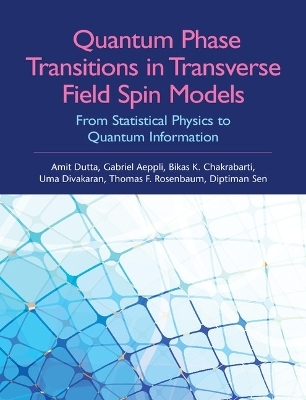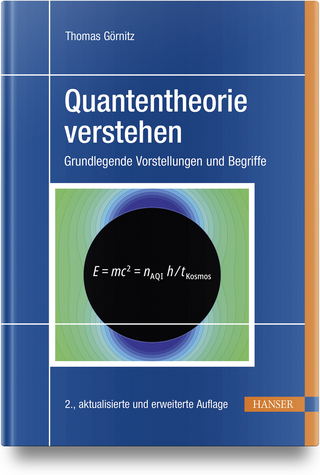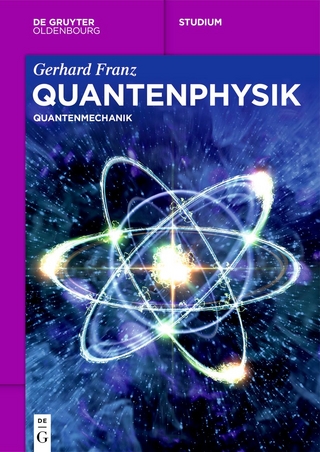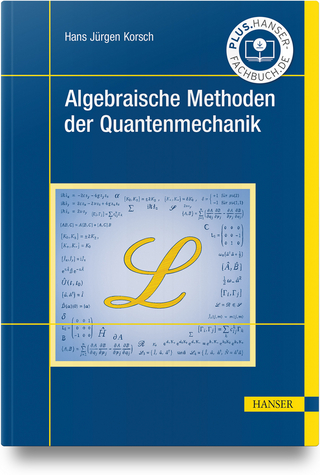
Quantum Phase Transitions in Transverse Field Spin Models
Cambridge University Press (Verlag)
978-1-107-06879-7 (ISBN)
The transverse field Ising and XY models (the simplest quantum spin models) provide the organising principle for the rich variety of interconnected subjects which are covered in this book. From a generic introduction to in-depth discussions of the subtleties of the transverse field Ising and related models, it includes the essentials of quantum dynamics and quantum information. A wide range of relevant topics has also been provided: quantum phase transitions, various measures of quantum information, the effects of disorder and frustration, quenching dynamics and the Kibble–Zurek scaling relation, the Kitaev model, topological phases of quantum systems, and bosonisation. In addition, it also discusses the experimental studies of transverse field models (including the first experimental realisation of quantum annealing) and the recent realisation of the transverse field Ising model using tunable Josephson junctions. Further, it points to the obstacles still remaining to develop a successful quantum computer.
Amit Dutta holds a PhD from the Saha Institute of Nuclear Physics, Kolkata. After postdoctoral experience at the Max Planck Institute for the Physics of Complex Systems in Dresden, Germany, and at Wuerzburg University, Germany, he joined the Indian Institute of Technology, Kanpur, in 2003, where he is currently a professor. He has written several highly cited papers on quantum phase transitions, quantum non-equilibrium dynamics and quantum information, and coauthored Quantum Ising Phases and Transitions in Transverse Ising Models (1996). He is a regular associate of the Abdus Salam International Center for Theoretical Physics, Trieste, Italy. Gabriel Aeppli is Quain Professor of Physics and Director at the London Centre for Nanotechnology. Prior to taking up these positions in the autumn of 2002, he was a Senior Research Scientist for NEC (Princeton), a Distinguished Member of Technical Staff at Bell Laboratories, a Research Assistant at the Massachusetts Institute of Technology, and an industrial co-op student at IBM. He holds a BSc in Mathematics and a PhD from the Massachusetts Institute of Technology. His honours include Fellowship of the Royal Society (2010), the IOP (Institute of Physics) Mott Prize (2008), the APS Oliver Buckley Prize (2005), the IUPAP Magnetism Prize/Neel Medal (2003), a Riso National Laboratory Fellowship (2002), the Royal Society Wolfson Research Merit Award (2002), the post of Mildner Lecturer at the Department of Electronic and Electrical Engineering, University College London (2002), Fellowship of the American Physical Society (1997) and Fellowship of the Japan Society for the Promotion of Science (1996). In addition, he has been a member and chairman of many panels, sponsored by the USDOE, the American Physical Society, EPSRC, and the National Research Council (US), among others. His personal research is currently focused on quantum information processing, magnetism, superconductivity, and the implications of nanotechnology for information processing and health care. Bikas K. Chakrabarti is Senior Professor of Theoretical Condensed Matter Physics at the Saha Institute of Nuclear Physics, Kolkata, and Visiting Professor of Economics at the Indian Statistical Institute, Kolkata. He received his doctorate in physics from Calcutta University in 1979. Following postdoctoral positions at the University of Oxford and Cologne University, he joined SINP in 1983. His research interests include the physics of fracture, quantum glasses, and the interdisciplinary sciences of optimisation, brain modelling, and econophysics. He has written several books and reviews on these topics. Professor Chakrabarti is a recipient of the S. S. Bhatnagar Award (1997). He has also received the Outstanding Referee Award of the American Physical Society (2010). Uma Divakaran holds Masters and PhD degrees from the Indian Institute of Technology, Kanpur. She is a recipient of the Alexander von Humboldt Postdoctoral Fellowship (2010) and worked in the group of Professor Heiko Rieger at Saarland University, Germany. She was also a Junior Associate of the Abdus Salam International Center for Theoretical Physics, Trieste, Italy, from 2009 to 2014. She is presently a Postdoctoral Fellow at the Indian Institute of Technology, Kanpur. She has worked on non-equilibrium dynamics and has written several highly cited papers on these topics. Thomas F. Rosenbaum holds a bachelor's degree in Physics with honors from Harvard University, and an MA and PhD in Physics from Princeton University. He presently serves as Provost of the University of Chicago. In addition to his responsibilities for academic and research programmes across the University, Rosenbaum serves on the Board of Governors for Argonne National Laboratory. He is an expert on the quantum mechanical nature of materials – the physics of electronic, magnetic and optical materials at the atomic level – that are best observed at temperatures near absolute zero. He conducted research at Bell Laboratories and at IBM Watson Research Center before joining the Chicago faculty in 1983. He directed the University's Materials Research Laboratory from 1991 to 1994 and the University's James Franck Institute from 1995 to 2001, and served as Vice President for Research and for Argonne National Laboratory from 2002 to 2006. His honours include an Alfred P. Sloan Research Fellowship, a Presidential Young Investigator Award, and the William McMillan Award for Outstanding Contributions to Condensed Matter Physics. Rosenbaum is an elected fellow and Centennial Lecturer of the American Physical Society, and an elected fellow of the American Academy of Arts and Sciences and the American Association for the Advancement of Science. He is also a member of the Board of Directors of the Bulletin of the Atomic Scientists. Diptiman Sen received his PhD in Physics from Princeton University in 1984. After postdoctoral work at Carnegie Mellon University and the University of Edinburgh, he joined the Indian Institute of Science in 1988 where he is now a Professor. His research interests include condensed matter systems in low dimensions, mesoscopic systems, and various aspects of quantum field theory. He is a member of the Editorial Board of Physical Review Letters for the period 2009 to 2015, and was recognised by the American Physical Society as an Outstanding Referee in 2009.
List of tables; 1. Quantum phase transitions; 2. Information theoretic measures close to a quantum critical point; 3. Non-equilibrium dynamics across quantum critical points; 4. Transverse Ising models in higher dimensions; 5. Transverse field models in one dimension; 6. Quantum phase transitions in related models; 7. Role of quenched disorder; 8. Related models with frustration; 9. Quantum information theoretic measures: transverse field and related models; 10. Non-equilibrium dynamics across quantum critical points: slow quenching; 11. Further studies on non-equilibrium dynamics; 12. Quenching and quantum information; 13. Some very recent developments in information and dynamics; 14. Experimental realisations of transverse field Ising systems; 15. Adiabatic quantum computations and transverse field models; 16. Concluding comments; Appendices; Notes; References; Index.
| Verlagsort | Cambridge |
|---|---|
| Sprache | englisch |
| Maße | 185 x 247 mm |
| Gewicht | 810 g |
| Themenwelt | Naturwissenschaften ► Physik / Astronomie ► Quantenphysik |
| Naturwissenschaften ► Physik / Astronomie ► Thermodynamik | |
| ISBN-10 | 1-107-06879-7 / 1107068797 |
| ISBN-13 | 978-1-107-06879-7 / 9781107068797 |
| Zustand | Neuware |
| Haben Sie eine Frage zum Produkt? |
aus dem Bereich


